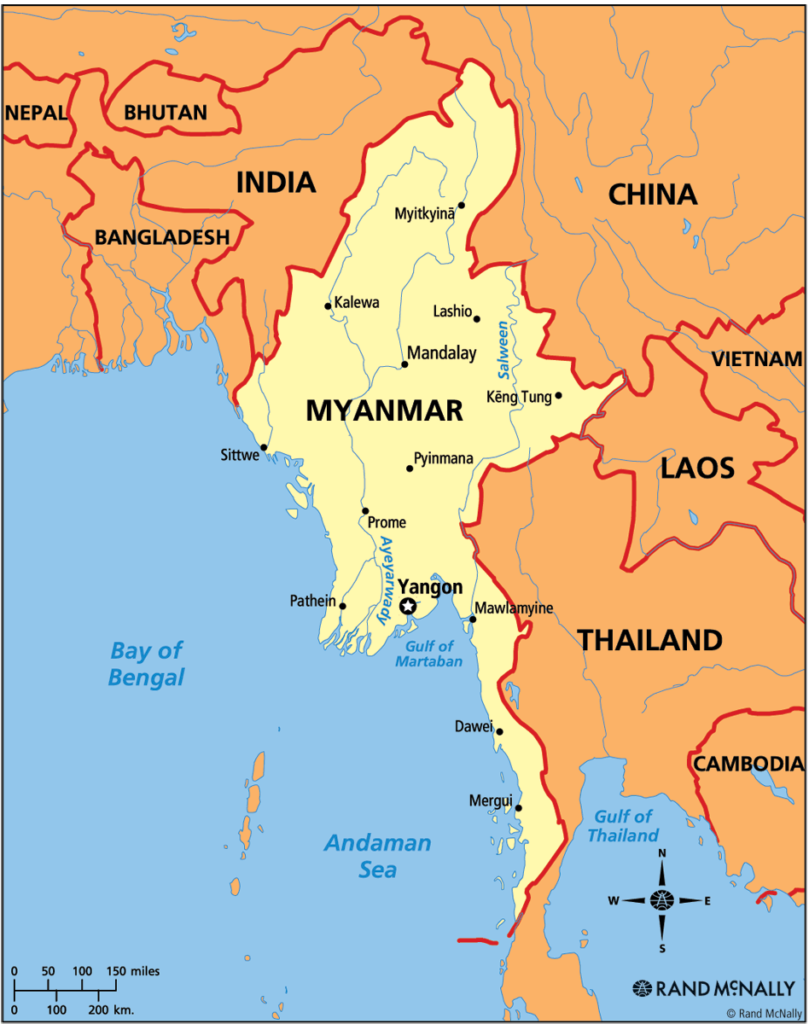(DIRE) “In Myanmar, the situation is tragic. The junta that has overthrown the elected government is using any means to intimidate and even kill because it knows that if it loses the war, [the empire] will crumble, an empire of more than 70 years based on profits and violence; this is why we are calling on the U.S. to impose economic sanctions against the junta as the EU has done, while the international community must recognize the unity government: we are not second-class citizens.”
Yimon Win Pe is a member of the Burmese community in Italy and left his country in 2003 at the age of 19.
He spoke to the Dire agency shortly before a meeting in Rome titled ‘The Spring Revolution in Myanmar,’ organized with the Italy-Burma Friendship Association ‘Giuseppe Malpeli’ of Parma, to report on the situation in the Asian country more than two years after the military coup.
In fact, on February 1, 2021, the Tatmadaw, the national army led by General Min Aung Hlaing, deposed the government that had emerged victorious from the previous November elections. Many politicians were arrested, including the leader of the party that had emerged victorious at the polls, the National League for Democracy (Nld), and Nobel Peace Laureate Aung San Suu Kyi, who has already been sentenced in several trials to fifteen years in prison.
A broad opposition movement has emerged. The Association for the Assistance of Myanmar Political Prisoners (Aapp) estimates [that] over the past 26 months [there have been] more than 21,000 arrests, including nearly 17 and a half thousand people still in detention-some of whom have already received a conviction-and 3,866 releases. Another 3,240 have reportedly lost their lives.
Opposition to the junta of self-proclaimed Prime Minister Hlaing, as Win Pe reports, “affects the entire population, regardless of age, gender or profession.”
But there is also a war being fought in Myanmar, which “has caused huge losses in the army, which is now even recalling retired military personnel to fight. If before the coup there were ‘spotty’ clashes” with individual ethnic-based armed groups that have been present in the country for years, today according to the activist “the conflict is nationwide.
The country is on fire, everyone is rebelling, in cities and villages, in the central and border regions.”
Despite the losses, however, Yimon Win Pe points out that “the junta can still count on revenues from natural resources: in the past two years three thousand million dollars have come in, used to buy weapons from Russia.
The United States, among the main buyers of gas and oil, has not yet imposed sanctions, unlike the EU.”
In fact, Brussels is in the fourth round of punitive measures that in total target 65 individuals linked to the coup and ten companies including Myanmar Oil and Gas Enterprise (Moge), the national oil company. “If Washington were to join – warns Win Pe – it would close a loophole through which blood money flows.”
In addition, the associations call for “recognition of our government of national unity, composed of the politicians elected in 2020, which now controls some territories.” That executive suffered an airstrike last April 11[, 2023] during the opening ceremony of new administrative offices in Pazigyi, a town that has become a bastion of resistance. Dozens were killed.
But the international reaction “has been weak,” as denounced by the Burmese community member in Italy, “because we are treated as second-class people. This is a sad behavior, which involves many other countries as well.”
The pressure from the military junta, according to the Italo-Burmese activist, would also reach exiles in our country: “The Embassy in Italy blackmails Burmese when they ask for passport renewals,” Win Pe again denounces, reporting that “if officials find photos or documents showing participation in demonstrations against the junta, they threaten not to issue the passport. Sometimes they hint that the procedure could be ‘unlocked’ in exchange for money, others ask for a document to be signed in which the person agrees never to protest or criticize the junta again.”
“The people of Myanmar are gaining freedom and democracy at a very high price,” Albertina Soliani, president of the Alcide Cervi Institute, former president of the parliamentary association Friends of Burma and a longtime friend of Aung San Suu Kyi, also tells Dire. “All this is before the eyes of the world, which is watching and silent. We cannot remain indifferent. People’s revolutions will win, humanity will win.”






